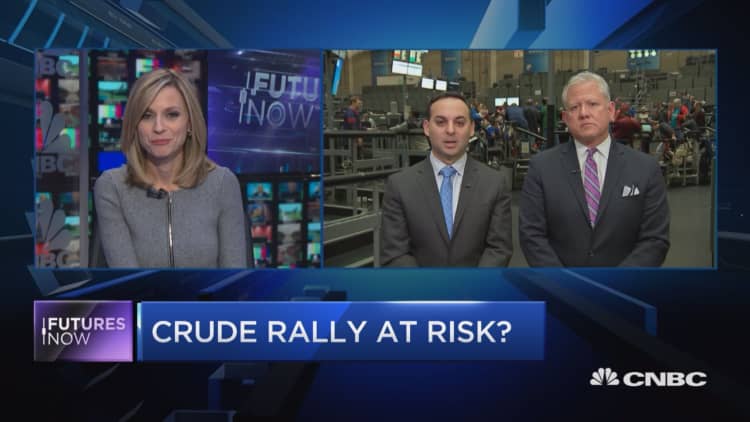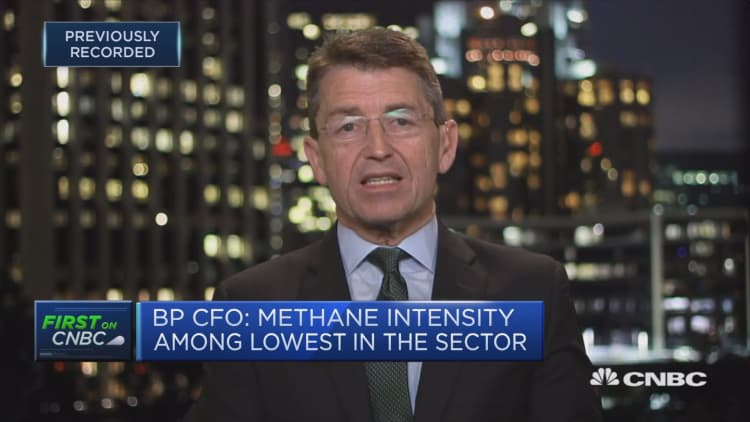Oil prices fell on Wednesday after U.S. crude inventories in the United States soared more than expected to their highest since September 2017 as production hit a record high.
The declines were somewhat tempered by the intensifying crisis in Venezuela and Washington's stopping Iranian oil sanction waivers as of May 1, with the fall in the global Brent benchmark more muted.
Crude futures bounced slightly along with the stock market after the Federal Reserve left interest rates unchanged, citing a lack of inflation pressure, but struggled to hold gains.

U.S. crude futures settled 31 cents lower at $63.60 per barrel. Brent crude oil futures were down 2 cents at $72.04 per barrel around 2:10 p.m. ET (1810 GMT).
U.S. crude inventories climbed last week 9.9 million barrels to 470.6 million barrels as imports grew to their highest since January and refining rates dropped below 90 percent of total capacity, the Energy Information Administration said.
The build far outstripped analysts' expectations of an increase of just 1.5 million barrels.
"A drop in refining activity and a rise in imports has helped propel crude inventories to another large build," said Matt Smith, director of commodity research at ClipperData. "The vast majority of the build was on the U.S. Gulf Coast - with refinery runs ticking lower and waterborne imports on the rise."
Markets also watched for developments in Venezuela, where opposition leader Juan Guaido called for a May 1 uprising against President Nicolas Maduro. Many observers feared the rallying cry could lead to escalating violence and further disruptions to crude supply, though the OPEC-member nation's oil-producing regions are far afield of the capital of Caracas.
The unrest adds to a range of fluid geopolitical factors which have roiled the oil market in recent months.
Oil prices have risen over 30% so far this year, and in April, Brent increased about 6.5% and WTI rose 6.3%, their fourth consecutive month of gains.
"There have been wild cards aplenty for the oil markets. The seemingly perennial U.S.-China trade spat, the extent of Venezuela's supply woes and the Iran factor are just some," PVM Oil Associates strategist Stephen Brennock said.
Oil markets have already tightened this year due to supply cuts led by OPEC as well as the sanctions on Venezuela and Iran.
Washington is set to revoke waivers for select countries to import Iranian oil on Wednesday and says it aims to drive down Iran's crude exports to zero.

"The Iran sanctions come on top of already fragile supplies and raise concerns about tightening markets," said Norbert Ruecker, head of research at Swiss bank Julius Baer.
OPEC meets in June to discuss production policy.
While President Donald Trump says he has demanded the group increase output to make up for the shortfall from Iran, OPEC's de facto leader Saudi Arabia said on Tuesday it had no immediate plan to do so.
"Recent comments from (Saudi Energy Minister Khalid) al-Falih confirm our view that the kingdom will respond cautiously with other oil producers and not pre-emptively ramp up production," said Giovanni Staunovo, analyst at UBS in Zurich.
Weekly U.S. oil production ticked up to a new high at 12.3 million barrels per day, EIA. The weekly reading had been stuck between 12 million bpd and 12.2 million bpd since mid-February, with U.S. output remaining constrained by pipeline bottlenecks in Texas.
— CNBC's Tom DiChristopher contributed to this report.

